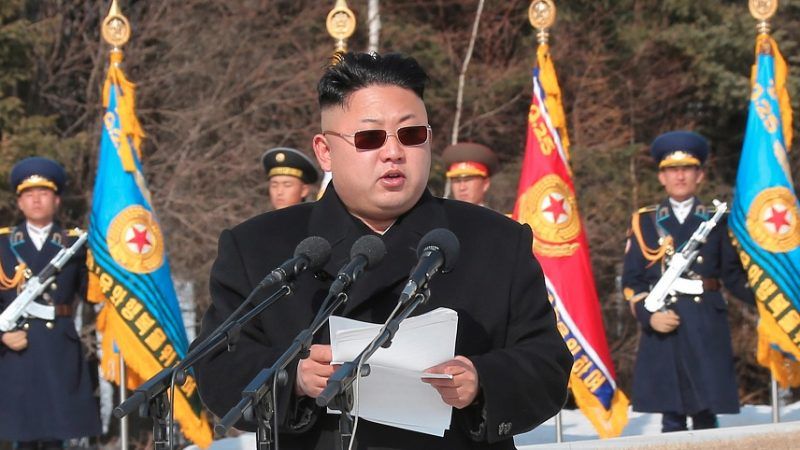Breaking the Pattern of Provocation, Outrage, and Escalation in Dealing With North Korea
Kim Jong-un's long game isn't suicidal annihilation, it's to remain in power.

Stop me if you've heard this one: North Korea has tested a new weapon. The United States and assorted allies have responded with strongly worded statements and a show of symbolic military force. The Kim Jong-un regime takes deep and dramatic offense and declares its enormous superiority.
We all briefly consider whether our homes are in a likely target area and, if not, how well we'd fare in a post-apocalyptic economy. And then everything goes back to normal until the North's next weapons test.
U.S. tensions with North Korea have settled into this regular pattern of provocation, outrage, and escalation. Pyongyang has fired 17 missiles in 11 tests since President Trump took office, making the outlined script a regular feature of the news cycle. The holding pattern is set.
But what if it isn't? Serious and repeated reports indicate the Trump White House is reviewing a wide range of options for dealing with North Korea, including forcible regime change entailing, in Trump's words, "major, major conflict."
The appeal of intervention is obvious if we interpret Pyongyang's persistence in developing nuclear weapons as a signal that Kim intends to do the unthinkable—to nuke a major urban area in the United States or perhaps South Korea or Japan—but a more sober assessment shows that interpretation is dangerous and simplistic.
The Kim regime is, of course, appalling in its inhumanity. The good impulses of those who advocate external military intervention to safely free the populace are admirable, though it cannot be reiterated enough that their proposal would almost certainly end in what Defense Secretary James Mattis has called a "catastrophic" war with "the worst kind of fighting in most people's lifetimes."
Kim rules over what has been justly called "the rape and defilement of an entire nation, a systematic and refined evil that only the human genius at its most perverted can produce." The evidence suggests his main goal is to continue doing so, to continue leading the comfortable (and apparently cheese-obsessed) life of a dictator safe from external regime change.
A credible nuclear arsenal is his best insurance for that goal. Kim is not suicidal; he is power-mad. Both derangements are dangerous, but they are not the same.
The better way to understand North Korean machinations is as a "huge game of blackmail," Ret. Col. Andrew Bacevich, a military historian, says. For all its posturing, Pyongyang is "an exceedingly weak and arguably very fragile regime" whose "principle objective is to remain in power," he says.
The point of all these weapons tests and bluster is probably not about actually nuking the American mainland, but rather manipulating far more powerful nations—South Korea, Japan, China, and, most importantly, the United States—into unwittingly and unwillingly maintaining a status quo with Kim in power.
As seen in this latest test, for example, Kim targets his missiles for the Sea of Japan, avoiding Japanese air space. This is a show of strength which doesn't amount to a concrete threat. The move is calculated to protect Kim's position.
A review of the most recent weapons test cycle is instructive. On the Fourth of July, the Kim regime triumphantly tested an intercontinental ballistic missile (ICBM), technology that could theoretically carry a nuclear weapon as far as Alaska (whether it could really carry the weapon is at this point unclear). The test was fêted with a spectacle of tap dance and song in North Korea, but elsewhere reactions were less than celebratory.
After conferring with President Xi Jinping of China and Prime Minister Shinzo Abe of Japan, President Trump pledged joint action against North Korea. He sent U.S. bombers on a flight—seen by the North as provocative—over the Korean Peninsula.
He warned Pyongyang he's considering "some pretty severe things" in response to this "very, very bad behavior." On Twitter, he marveled Kim doesn't "have anything better to do with his life."
But the whole point of the test is that Kim does have things he wants to do with his life, namely, to continue being in power. Kim wants the bomb because he thinks it will "ensure that anyone considering imposing regime change won't take the risk," argues Harry J. Kazianis at The Week. He tested ICBMs on Independence Day because he believes that is how he stays on top of his hermit kingdom.
The lesson here may be a difficult one, but one Trump can grasp. For all his inconsistency, Trump has repeatedly expressed an openness to direct diplomacy with North Korea. "If it would be appropriate for me to meet with [Kim], I would absolutely, I would be honored to do it," he said as recently as May.
Whether direct Trump-Kim talks are the wisest course is subject to debate, but Washington must trade saber-rattling for conversation with Pyongyang. This is a critical step in the right direction.
The alternative—to continue to the current cycle of escalation without any dialogue—is a dangerous game, making ever more probable the "major, major conflict" no party of this dispute really wants.
This is a road of grave miscalculation and catastrophic result, but it is a road we do not have to take.


Show Comments (20)